英语一般现在时练习题及答案
英语一般现在时题20套(带答案)及解析
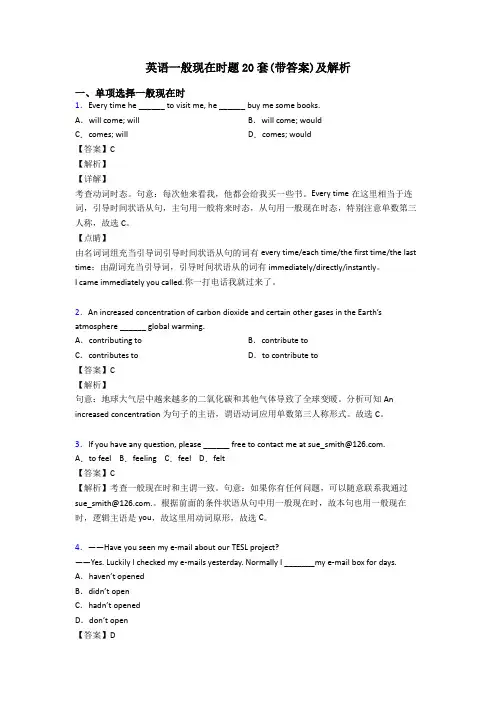
【答案】B
【解析】
试题分析:考查祈使句。本文属祈使句。带有命令的口气,相当于“All of you , please gather at the school gate!”所以选B。所有人到学校门口集合,我们马上要出发了。
考点:考查祈使句
考点:考查动词的时态。
16.You’d better write down her address before you ________ it.
A.forgetB.are forgetting
C.forgotD.will forget
【答案】A
【解析】
试题分析:考查动词的时态。句意:趁你还没有忘记,最好把电话号码记下来。在时间状语从句、条件状语从句和让步状语从句中,用一般现在时代替将来时,故选A项
A.have told; washB.have been told; wash
C.was told; washedD.have been told; are washed
【答案】B
【解析】
考察时态。根据题意,我想买那种衣服,因为有人告诉过我他们洗起来不错。可知从句内容为过去已经完成的动作,故用过去完成时态。他们洗起来不错则是一个客观存在的事实,过去存在,现在及将来都会存在,故用一般现在时态。选B。
3.If you have any question, please ______ free to contact me at sue_smith@.
A.to feel B.feeling C.feel D.felt
【答案】C
【解析】考查一般现在时和主谓一致。句意:如果你有任何问题,可以随意联系我通过sue_smith@.。根据前面的条件状语从句中用一般现在时,故本句也用一般现在时,逻辑主语是you,故这里用动词原形,故选C。
(英语)英语一般现在时题20套(带答案)
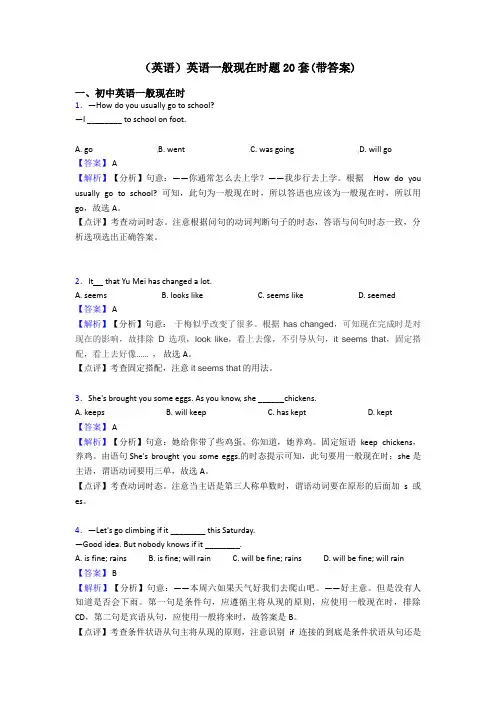
(英语)英语一般现在时题20套(带答案)一、初中英语一般现在时1.—How do you usually go to school?—I ________ to school on foot.A. goB. wentC. was goingD. will go【答案】 A【解析】【分析】句意:——你通常怎么去上学?——我步行去上学。
根据How do you usually go to school? 可知,此句为一般现在时,所以答语也应该为一般现在时,所以用go,故选A。
【点评】考查动词时态。
注意根据问句的动词判断句子的时态,答语与问句时态一致,分析选项选出正确答案。
2.It that Yu Mei has changed a lot.A. seemsB. looks likeC. seems likeD. seemed【答案】 A【解析】【分析】句意:于梅似乎改变了很多。
根据has changed,可知现在完成时是对现在的影响,故排除D选项,look like,看上去像,不引导从句,it seems that,固定搭配,看上去好像……,故选A。
【点评】考查固定搭配,注意it seems that的用法。
3.She's brought you some eggs. As you know, she ______chickens.A. keepsB. will keepC. has keptD. kept【答案】 A【解析】【分析】句意:她给你带了些鸡蛋。
你知道,她养鸡。
固定短语keep chickens,养鸡。
由语句She's brought you some eggs.的时态提示可知,此句要用一般现在时;she是主语,谓语动词要用三单,故选A。
【点评】考查动词时态。
注意当主语是第三人称单数时,谓语动词要在原形的后面加s或es。
4.—Let's go climbing if it ________ this Saturday.—Good idea. But nobody knows if it ________.A. is fine; rainsB. is fine; will rainC. will be fine; rainsD. will be fine; will rain【答案】 B【解析】【分析】句意:——本周六如果天气好我们去爬山吧。
英语一般现在时练习题及答案
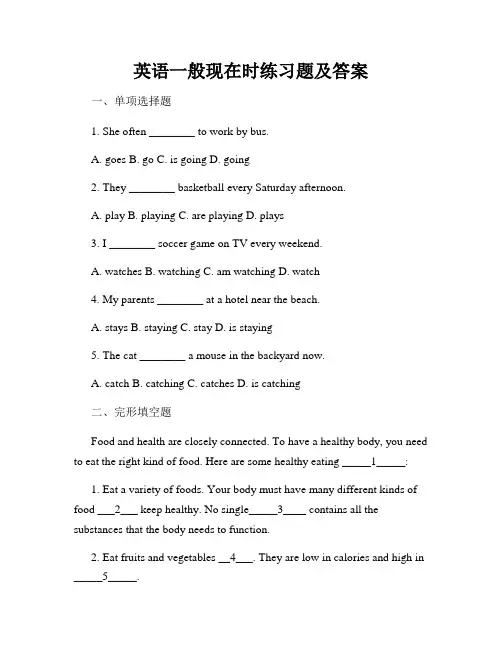
英语一般现在时练习题及答案一、单项选择题1. She often ________ to work by bus.A. goesB. goC. is goingD. going2. They ________ basketball every Saturday afternoon.A. playB. playingC. are playingD. plays3. I ________ soccer game on TV every weekend.A. watchesB. watchingC. am watchingD. watch4. My parents ________ at a hotel near the beach.A. staysB. stayingC. stayD. is staying5. The cat ________ a mouse in the backyard now.A. catchB. catchingC. catchesD. is catching二、完形填空题Food and health are closely connected. To have a healthy body, you need to eat the right kind of food. Here are some healthy eating _____1_____:1. Eat a variety of foods. Your body must have many different kinds of food ___2___ keep healthy. No single_____3____ contains all the substances that the body needs to function.2. Eat fruits and vegetables __4___. They are low in calories and high in _____5_____.3. Drink milk every day, it is good _____6_____ your bones and teeth. Children should drink more milk than adults.4. Fish has protein, minerals and vitamins, and it is ____7____ low in fat. You should eat fish twice _____8______ week.5. Drink at least ____9_____ glasses of water a day. It is very important to keep your body _____10_____ and help you digest food.1. A. books B. topics C. opinions D. suggestions2. A. and B. or C. but D. so3. A. person B. book C. food D. country4. A. first B. firstly C. the first D. as first5. A. food B. nutrition C. drink D. dosage6. A. for B. in C. at D. of7. A. here B. there C. their D. are8. A. a B. an C. the D. at9. A. six B. seven C. eight D. nine10. A. dry B. thirsty C. wet D. dehydrated三、根据所给的动词提示,写出正确的动词形式。
英语一般现在时题20套(带答案)含解析
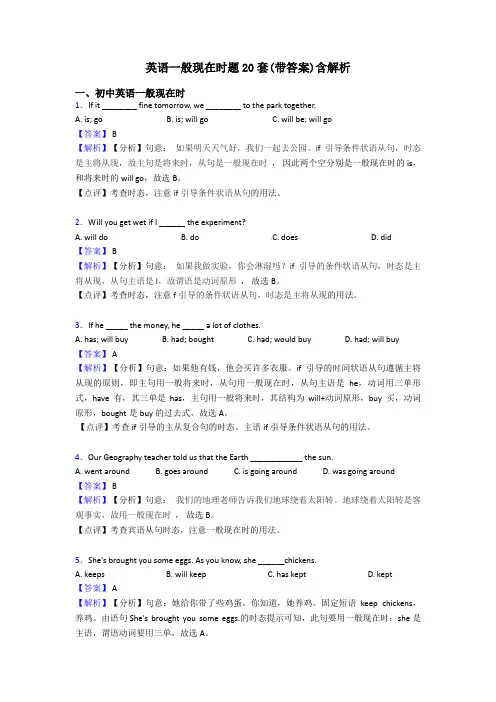
英语一般现在时题20套(带答案)含解析一、初中英语一般现在时1.If it ________ fine tomorrow, we ________ to the park together.A. is; goB. is; will goC. will be; will go【答案】 B【解析】【分析】句意:如果明天天气好,我们一起去公园。
if 引导条件状语从句,时态是主将从现,故主句是将来时,从句是一般现在时,因此两个空分别是一般现在时的is,和将来时的will go,故选B。
【点评】考查时态,注意if引导条件状语从句的用法。
2.Will you get wet if I ______ the experiment?A. will doB. doC. doesD. did【答案】 B【解析】【分析】句意:如果我做实验,你会淋湿吗?if引导的条件状语从句,时态是主将从现,从句主语是 I,故谓语是动词原形,故选B。
【点评】考查时态,注意f引导的条件状语从句,时态是主将从现的用法。
3.If he _____ the money, he _____ a lot of clothes.A. has; will buyB. had; boughtC. had; would buyD. had; will buy【答案】 A【解析】【分析】句意:如果他有钱,他会买许多衣服。
if引导的时间状语从句遵循主将从现的原则,即主句用一般将来时,从句用一般现在时,从句主语是he,动词用三单形式,have有,其三单是has,主句用一般将来时,其结构为will+动词原形,buy买,动词原形,bought是buy的过去式,故选A。
【点评】考查if引导的主从复合句的时态。
主语if引导条件状语从句的用法。
4.Our Geography teacher told us that the Earth ____________ the sun.A. went aroundB. goes aroundC. is going aroundD. was going around【答案】 B【解析】【分析】句意:我们的地理老师告诉我们地球绕着太阳转。
英语一般现在时试题(有答案和解析)

英语一般现在时试题(有答案和解析)一、初中英语一般现在时1.I often _______.She is very kind.A. miss Mr. LiuB. miss Miss LiuC. am missing Miss LiuD. am missing Mr. Liu【答案】B【解析】【分析】句意:我经常想念刘老师。
她很和蔼。
根据句中的often可知应使用一般现在时态,又有下文中的she可知应为女性,故选B。
【点评】考查一般现在时态。
2.I think joining the English club ________ the best way to improve your English.A. areB. wasC. isD. were【答案】 C【解析】【分析】句意:我认为加入英语俱乐部是提高英语水平的最好方法。
描述客观事实用一般现在时,主语是动名词joining,谓语是单三式,故be用is,故选C。
【点评】考查时态,注意主谓一致的用法。
3.She _____ out alone at night.A. dare not to goB. dares not goC. doesn't dare to goD. doesn't dares go【答案】 C【解析】【分析】句意:晚上她不敢一个人出去。
dare可以作情态动词也可以作行为动词,作情态动词时,后面直接跟动词原形,没有人称与数的变化,构成否定时直接在dare 后加not,作行为动词时后跟动词不定式,构成否定需要助动词,故答案是C。
【点评】考查dare的用法,注意dare做情态动词和行为动词的用法上的区别。
4.If he _____ the money, he _____ a lot of clothes.A. has; will buyB. had; boughtC. had; would buyD. had; will buy【答案】 A【解析】【分析】句意:如果他有钱,他会买许多衣服。
英语一般现在时题20套(带答案)及解析
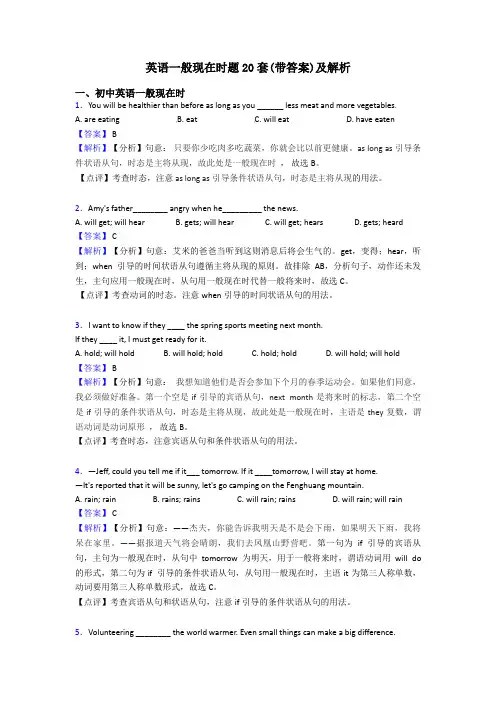
英语一般现在时题20套(带答案)及解析一、初中英语一般现在时1.You will be healthier than before as long as you ______ less meat and more vegetables.A. are eatingB. eatC. will eatD. have eaten【答案】 B【解析】【分析】句意:只要你少吃肉多吃蔬菜,你就会比以前更健康。
as long as引导条件状语从句,时态是主将从现,故此处是一般现在时,故选B。
【点评】考查时态,注意as long as引导条件状语从句,时态是主将从现的用法。
2.Amy's father________ angry when he_________ the news.A. will get; will hearB. gets; will hearC. will get; hearsD. gets; heard【答案】 C【解析】【分析】句意:艾米的爸爸当听到这则消息后将会生气的。
get,变得;hear,听到;when引导的时间状语从句遵循主将从现的原则。
故排除AB,分析句子,动作还未发生,主句应用一般现在时,从句用一般现在时代替一般将来时,故选C。
【点评】考查动词的时态。
注意when引导的时间状语从句的用法。
3.I want to know if they ____ the spring sports meeting next month.If they ____ it, I must get ready for it.A. hold; will holdB. will hold; holdC. hold; holdD. will hold; will hold【答案】 B【解析】【分析】句意:我想知道他们是否会参加下个月的春季运动会。
如果他们同意,我必须做好准备。
第一个空是if引导的宾语从句,next month是将来时的标志,第二个空是if引导的条件状语从句,时态是主将从现,故此处是一般现在时,主语是they复数,谓语动词是动词原形,故选B。
初中英语50题及解答(一般现在时)
初中英语50题及解答(一般现在时)1)She _____ the piano every day.A. playB. playsC. playingD. played2)He _____ not like bananas.A. doB. doesC. doingD. did3)The sun _____ in the east.A. riseB. risesC. risingD. rose4)They usually _____ to school by bus.A. goB. goesC. goingD. went5)My mother _____ dinner at this time.A. cookB. cooksC. cookingD. cooked6)I _____ my homework every evening.A. doB. doesC. doingD. did7)Birds _____ in the sky.A. flyB. fliesC. flyingD. flew8)Jenny _____ her teeth twice a day.A. brushB. brushesC. brushingD. brushed9)We _____ English every morning.A. studyB. studiesC. studyingD. studied10) He _____ to the radio in his free time.A. listenB. listensC. listeningD. listened11)My father _____ coffee every morning.A. drinkB. drinksC. drinkingD. drank12)I _____ to school every day.A. walkB. walksC. walkingD. walked13)The teacher _____ in the classroom.A. isB. areC. amD. be14)We _____ soccer every weekend.A. playB. playsC. playingD. played15)She _____ her homework after school.A. doB. doesC. doingD. done16)Cats _____ mice.A. chaseB. chasesC. chasingD. chased17)They _____ to bed early.A. goB. goesC. goingD. went18)He _____ the newspaper every day.A. readB. readsC. readingD. readed19)My sister _____ a shower in the morning.A. takeB. takesC. takingD. took20)I _____ TV in the evening.A. watchB. watchesC. watchingD. watched21)He always _____ his homework after dinner.A. finishesB. finishC. finishingD. finished22)My friends _____ basketball every weekend.A. playsB. playC. playingD. played23)The sun _____ in the east.A. riseB. risesC. risingD. rose24)Birds _____ in the sky.A. flyB. fliesC. flyingD. flew25)I _____ breakfast at 7am every day.A. haveB. hasC. havingD. had26)She _____ to music in her free time.A. listensB. listenC. listeningD. listened27)My parents _____ dinner at home every night.A. cooksB. cookC. cookingD. cooked28)He _____ English very well.A. speaksB. speakC. speakingD. spoke29)The dog _____ its tail when it’s happy.A. wagsB. wagC. waggingD. wagged30)We _____ to school by bus every day.A. goesB. goC. goingD. went31)My sister _____ a book every week.A. readB. readsC. readingD. readed32)She _____ a cup of coffee every morning.A. drinksB. drinkC. drinkingD. drunk33)Every day, the sun _____ in the east.A. riseB. risesC. risingD. rose34)I _____ to the gym three times a week.A. goesB. goC. goingD. went35)My parents _____ to work by car.A. goesB. goC. goingD. went36)He _____ to school at 8 am every day.A. leavesB. leaveC. leavingD. left37)The library _____ at 9 am every day.A. opensB. openC. openingD. opened38)She _____ her teeth before bed every night.A. brushesB. brushC. brushingD. brushed39)It _____ in winter here.A. snowsB. snowC. snowingD. snowed40)The flowers _____ beautiful in spring.A. looksB. lookC. lookingD. looked41)My father always _____ to work at 7 am.A. goB. goesC. goingD. went42)Lucy and her brother _____ to school together every day.A. walksB. walkC. walkingD. walked43)The train _____ at 9 o’clock every morning.A. leavesB. leaveC. leavingD. left44)I usually _____ dinner at home.A. eatsB. eatC. eatingD. ate45)The cat _____ milk every day.A. drinksB. drinkC. drinkingD. drank46)We _____ basketball every weekend.A. playsB. playC. playingD. played47)The supermarket _____ at 8 am every day.A. opensB. openC. openingD. opened48)She always _____ her homework after dinner.A. doesB. doC. doingD. did49)My brother _____ the guitar every evening.A. playsB. playC. playingD. played50)The birds _____ south for the winter.A. fliesB. flyC. flyingD. flew答案及解析:1. 答案:B解析:根据一般现在时的规则,第三人称单数后的动词需要加s。
英语一般现在时题20套(带答案)含解析
英语中有些动词在形式上是主动的,含义上却是被动的,但是这些动词这样用时又不是不及物动词。常见的这类动词有:sell, wash, cook, wear, rite, look, open, shut, translate, read, last, cut等。
—Would you like a piece of this kind of cloth?
英语一般现在时题20套(带答案)含解析
一、单项选择一般现在时
1.Honesty ___________ an important role in a child’s ability to succeed in school and later life.
A.playedB.plays
C.had playedD.has played
A.finding; reflectingB.found; reflected
C.found; to reflectD.found; reflect
【答案】D
【解析】
考察非谓语动词。过去分词做定语表示被动的,发生过的动作。句意:在空气中许多被发现的气体实际上反映了从地球表面扩散又回到地球的热能。前文动词为gases的定语,发生过的用过去分词,下文从此为句子谓语。叙述一个客观存在的事实,用一般现在时态,gases为复数,故动词用原形,选D。
说明这种纸易撕烂,是主语的性质。本题即考查这种笔所具备的特点,故用现在时的主动语态。A为一般现在时的被动语态,B为现在进行时,C一般过去时。
考点:考查时态语态的用法。
7.He’s been informed that he ________ for the scholarship because of his academic background.
六年级英语一般现在时单选题30题(带答案)
六年级英语一般现在时单选题30题(带答案)1.She _____ to school by bus every day.A.goB.goesC.goingD.went答案:B。
一般现在时中,当主语是第三人称单数时,动词要用第三人称单数形式。
she 是第三人称单数,go 的第三人称单数形式是goes。
选项A 是原形;选项C 是现在分词;选项D 是过去式。
2.They _____ their homework after school.A.doB.doesC.doingD.did答案:A。
一般现在时中,主语they 是复数,动词用原形。
选项B 是第三人称单数形式;选项C 是现在分词;选项D 是过去式。
3.He _____ sports in his free time.A.playB.playsC.playingD.played答案:B。
he 是第三人称单数,一般现在时中动词用第三人称单数形式plays。
选项A 是原形;选项C 是现在分词;选项D 是过去式。
4.We _____ an art class on Tuesdays.A.haveB.hasC.havingD.had答案:A。
we 是复数,一般现在时中动词用原形。
选项B 是第三人称单数形式;选项C 是现在分词;选项D 是过去式。
5.My sister _____ books in the evening.A.readB.readsC.readingD.readed答案:B。
my sister 是第三人称单数,一般现在时中动词用第三人称单数形式reads。
选项 A 是原形;选项C 是现在分词;选项D 是错误形式。
6.I _____ to music every day.A.listenB.listensC.listeningD.listened答案:A。
I 是第一人称,一般现在时中动词用原形。
选项B 是第三人称单数形式;选项C 是现在分词;选项D 是过去式。
(英语)英语一般现在时题20套(带答案)及解析
(英语)英语一般现在时题20套(带答案)及解析一、初中英语一般现在时1.— Let's _______ basketball.— That _______ good.A. playing; isB. play; soundsC. play; is soundD. to play; sounds【答案】 B【解析】【分析】句意:——我们一起打篮球吧。
——那听起来很好。
let's后接动词原形,排除选项A和D;sound是系动词,后跟形容词作表语,其主语That表单数含义。
故选B。
【点评】考查祈使句及系动词。
2.I want to know if they ____ the spring sports meeting next month.If they ____ it, I must get ready for it.A. hold; will holdB. will hold; holdC. hold; holdD. will hold; will hold【答案】 B【解析】【分析】句意:我想知道他们是否会参加下个月的春季运动会。
如果他们同意,我必须做好准备。
第一个空是if引导的宾语从句,next month是将来时的标志,第二个空是if引导的条件状语从句,时态是主将从现,故此处是一般现在时,主语是they复数,谓语动词是动词原形,故选B。
【点评】考查时态,注意宾语从句和条件状语从句的用法。
3.She's brought you some eggs. As you know, she ______chickens.A. keepsB. will keepC. has keptD. kept【答案】 A【解析】【分析】句意:她给你带了些鸡蛋。
你知道,她养鸡。
固定短语keep chickens,养鸡。
由语句She's brought you some eggs.的时态提示可知,此句要用一般现在时;she是主语,谓语动词要用三单,故选A。
- 1、下载文档前请自行甄别文档内容的完整性,平台不提供额外的编辑、内容补充、找答案等附加服务。
- 2、"仅部分预览"的文档,不可在线预览部分如存在完整性等问题,可反馈申请退款(可完整预览的文档不适用该条件!)。
- 3、如文档侵犯您的权益,请联系客服反馈,我们会尽快为您处理(人工客服工作时间:9:00-18:30)。
一般现在时练习题
用所给词的正确形式填空
1. We often___________(play) on the playgound.
2. He _________(get) up at six o’clock.
3. __________you _________(brush) your teeth every morning.
4. What____ (do) he usually _____(do) after school?
5. Danny _______(study) English, Chinese, Maths, Science and Art at school.
6. Mike sometimes __________(go) to the park with his sister.
7. At eight at night, she ________(watch) TV with his parents.
8. ________ Mike________(read) English every day?
9. How many lessons ______your classmate____(have) on Monday?
10. What time ____his mother_________(do) the housework?
11. He often ______(have) dinner at home. 12. Daniel and Tommy___ (be) in Class One. 13. We____ (not watch) TV on Monday. 14. Nick _____(not go) to the zoo on Sunday. 15. They______ (like) the World Cup? 16. What ____they often ____(do) on Saturdays
17. Your parents________ (read) newspapers every day?
18. The girl______ (teach) us English on Sundays.
19. She and I _______(take) a walk together every evening.
20. There_______ (be) some water in the bottle. 21. Mike ______(like) cooking.
22. They_______ (have) the same hobby. 23. My aunt______ (look) after her baby carefully.
24. You always____ (do) your homework well. 25. I_____ (be) ill. I’m staying in bed.
26. She_____ (go) to school from Monday to Friday. 27. Liu Tao _____(do) not like PE.
28. The child often______ (watch) TV in the evening.
29. Su Hai and Su Yang ______(have) eight lessons this term.
30. -What day ______(be) it today? -It’s Saturday.
31. Don’t make a noise. Grandpa __________(sleep).
32. Tom’s family__________(watch) TV.
33. It ________(take) me two hours to finish my homework last night.
34. What ______ your mother _______(do) every evening? She _______(wash) clothes.
35. _______ it ______ (rain)every day?
36. What _______(do) you _______ on Sundays ? We ________ (play) football.
37. There ________ (be) a football match on TV every morning.
38. They often ________ (visit) the Great Wall.
39. Who _______ (dance) the best in your class?
40. He _____________ (not come).
41. The earth __________ (move) round the sun.
42 She ________ (buy) a sweater.
43. Mr. Wang often______( go) to Shanghai.
改句子
1. Do you often play football after school? (肯定回答)
2. I have many books. (改为否定句)
3. Gao Shan’s sister likes playing table tennis (改为否定句)
答案:用所给词填空
1.play 2 gets 3 Do you 4 does do 5 studies 6 goes 7 watches 8 Does read
9 do have 10 does do 11 has 12 are 13 don’t watch 14 doesn’t go 15 likes 16 do do
17 read 18 teaches 19 take 20 is 21 likes 22 has 23 looks 24 do 25 am 26 goes 27 does 28 watches 29 have 30 is 31 is sleeping 32 watch 33 took 34 does do washes 35 Does rain 36 do do play 37 is 38 visit 39 dances 40 didn’t come 41 moves 42 bought 43 goes
改句子
1 Yes, I /we do.
2 I don’t have many books.
3. Does Gao Shan’s sister like playing table tennis ?
4. Does she live in a small town near New York?
5. Do you I watch TV every day?
6.Does David have a goal?
7. We don’t have four lessons.
8. Nancy runs fast.
9. Does your dog run fast?
10-----14 小题的答案课堂上更正
写出下列动词的第三人称单数形式:
1. washes matches guesses studies finishes goes snows carries
2. stops sees drives lets carries keeps joins finds thinks teaches catches
3. stays begins forgets lies runs rgives rings dances hopes
单项选择
1-----5 DADDD 6---10 ACCCC 11—13 BDD
翻译
1.He studies at No. 3 Primary School. He goes to school at 7 everymorning.
2.My father waters the flowers every morning.
3.My daughter likes watching TV and listening to the music.
4.Does Sandy play table tennis after school?No.
She studies hard. She reads books after school.
5 We have science at nine.
6 My favourite lesson is English.
7 We don’t have chemistry at half past two. 8 Do you go home at 3 in the afternoon?
9 Lessons starts at 8. 10 My father reads newspaper on Sunday morning.
11 She does her homework every day.
改错 1. Does your brother speak English?
2. Does he like going fishing?
3. He likes playing games after class.
4. Mr. Wu teaches us English.
5. She doesn’t do her homework every evening.。
